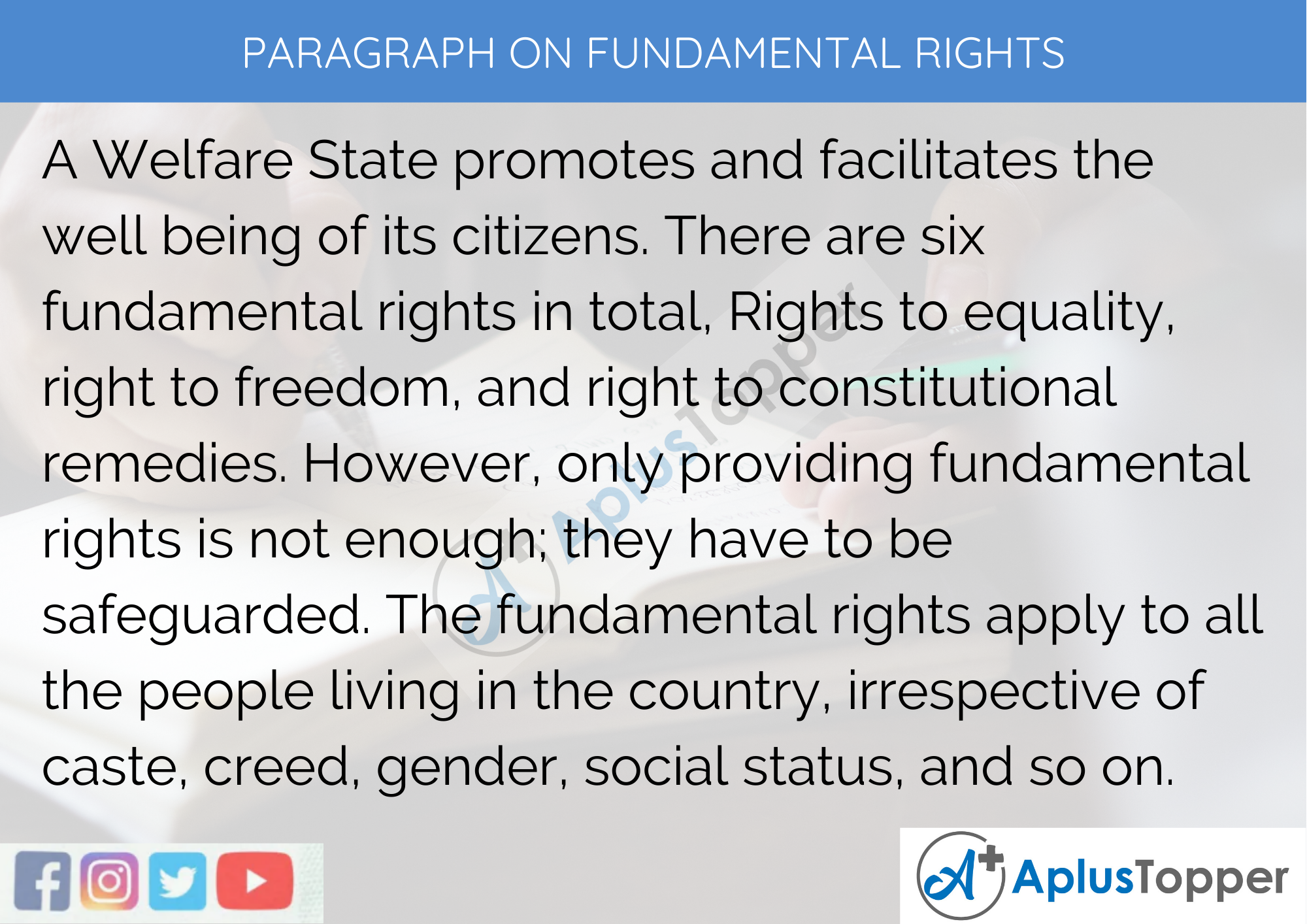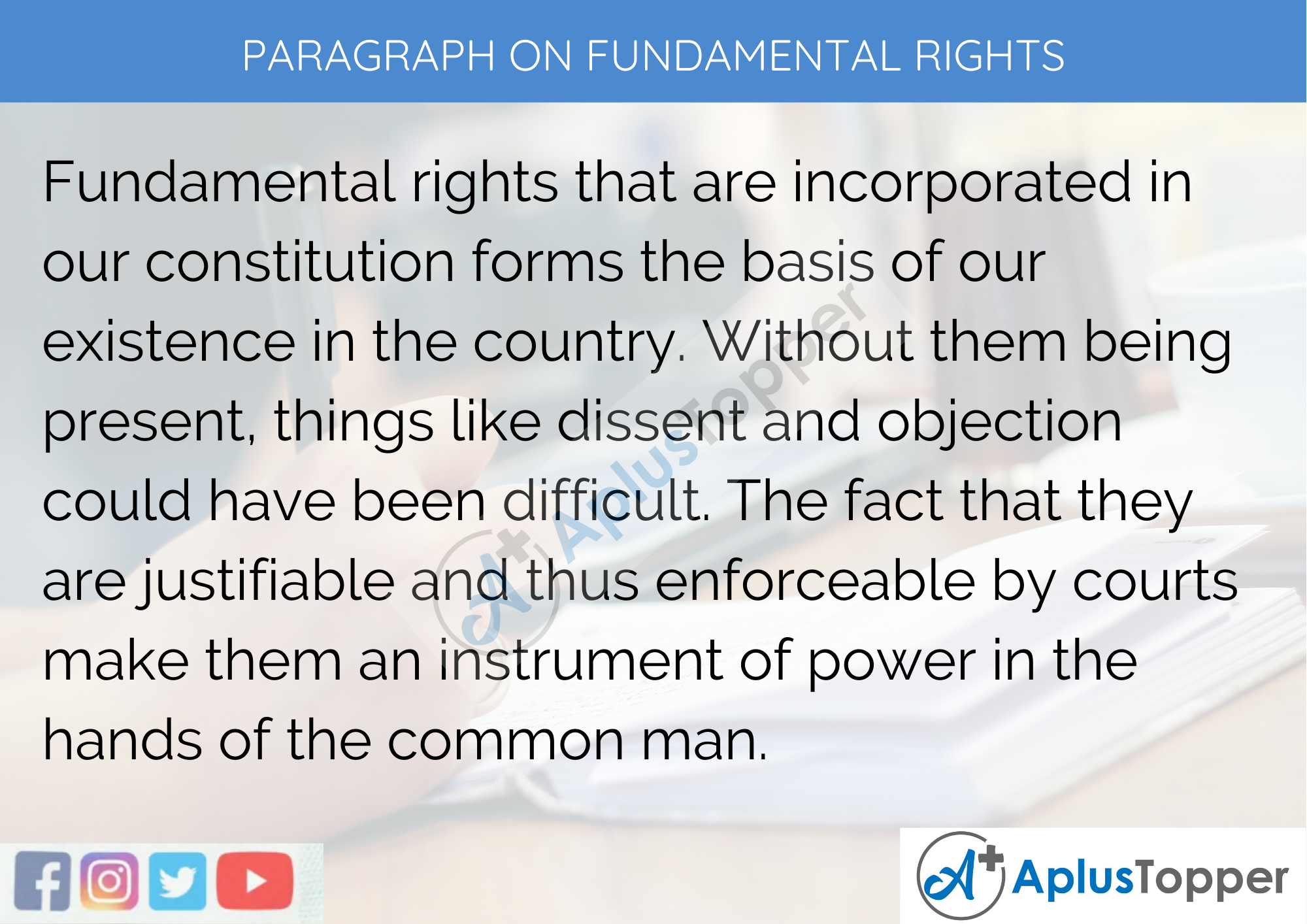Paragraph On Fundamental Rights: Fundamental Rights are the basic human rights given to a country’s citizens. These rights are justiciable; if someone doesn’t abide by these rights, they can be subjected to a court of law. These rights are stated in Part III of the Constitution. Fundamental rights help in the development of the State.
You can read more Paragraph Writing about articles, events, people, sports, technology many more.
Paragraph On Fundamental Rights – 100 Words for Classes 1, 2, 3 Kids
The Fundamental Rights are a list of rights that help in the development of the citizens in a country. Fundamental rights are enforceable by the court of law. Fundamental rights help in making a State, a Welfare State.
A Welfare State promotes and facilitates the well being of its citizens. There are six fundamental rights in total, Rights to equality, right to freedom, and right to constitutional remedies. However, only providing fundamental rights is not enough; they have to be safeguarded. The fundamental rights apply to all the people living in the country, irrespective of caste, creed, gender, social status, and so on.

Paragraph On Fundamental Rights – 150 Words for Classes 4, 5 Children
Fundamental Rights are stated in Part III of the Indian Constitution. These rights help in the development of the citizens in our country. Fundamental rights are also justiciable, which means that if someone fails to abide by such laws, they can be subjected to the court of law. Fundamental rights apply to all the citizens throughout the country irrespective of caste, gender, creed, and so on.
Fundamental rights help in creating a welfare state. A welfare state is a country where the prime objective is to look after the well being of the citizens in the country. There are six fundamental rights in our country, right to equality, cultural and educational rights, right to freedom, right to freedom of religion, right against exploitation, and right to constitutional remedies. These fundamental rights are necessary because it helped in the betterment of the human race and was created to protect people in times of difficulty.
Paragraph On Fundamental Rights – 200 Words for Classes 6, 7, 8 Students
Fundamental Rights are rights that help in the development of citizens in a country. In India, fundamental rights are stated in part III of the constitution. These rights help in the upliftment of people belonging to a social class of lower standing. If someone fails to abide by fundamental rights, they are answerable to the court of law.
Fundamental rights apply to all the citizens throughout the country irrespective of caste, gender, creed, and so on. A welfare state is a country where the prime objective is to look after the well being of the citizens in the country. Fundamental rights help in creating such a Welfare state. There are six fundamental rights in our country, right to equality, cultural and educational rights, right to freedom, right to freedom of religion, right against exploitation, and right to constitutional remedies.
The significance of fundamental rights is that it helps in the betterment of people in a society. for example, the right to equality prohibits discrimination based on color, caste, gender, etc. It talks about how all people should have equal access to public places and employment. Therefore, just like this, all other fundamentals rights were created for the benefit of the common mass.
Paragraph On Fundamental Rights – 250 to 300 Words for Classes 9, 10, 11, 12 And Competitive Exam Students
Fundamental rights that are incorporated in our constitution forms the basis of our existence in the country. Without them being present, things like dissent and objection could have been difficult. The fact that they are justifiable and thus enforceable by courts make them an instrument of power in the hands of the common man. The Government can suspend the clauses under which they operate fundamental rights in times of an emergency, which can be harmful and dangerous.
In India, fundamental rights have been suspended during the National Emergency period, which was put forward by then Prime Minister Indira Gandhi in the year 1971. During that time, many prominent people of the society and political personalities were sent to prison without any charges.
After her Government fell with the forthcoming elections, the succeeding premiership of Morarji Desai made it difficult for any incumbent government to call for an emergency. The necessity of fundamental rights was only realized during that time. Fundamental rights are not significant because courts can enforce them, but because they can guarantee a person’s freedom, access, and institution.
Fundamental rights over the years have undergone numerous interpretations by India’s Supreme Court, and hence they have had different meanings attached to them. Earlier, the Right to Education was only a part of the Directive Principles, but later it was incorporated into the fifth part of the constitution. This gave education a sharp definition in terms of requirement and access towards the children and people of the country and ushered in new legislation sets to substantiate the same.

FAQ’s on Paragraph On Fundamental Rights
Question 1.
What does the word ‘fundamental rights’ mean?
Answer:
The word fundamental rights are guaranteed by the fifth part of the constitution and enforceable in a court of law.
Question 2.
What are the types of fundamental rights?
Answer:
The different types of fundamental rights include the right to equality, right to freedom of expression, right against exploitation, cultural rights, right to constitutional remedies and right to education
Question 3.
What is the newest fundamental right to be incorporated?
Answer:
The newest fundamental right to be incorporated is the right to education. It was done in the year 2011 to increase the acess of education.
Question 4.
Who is the essence of fundamental rights?
Answer:
The essence of fundamental rights is rooted in its various provisions that give meaning to the existence of citizens in a country to create opportunities that can deliver them their wishes, desires, and aspirations.
